University Research: Authoritarian Parenting Styles and Child Behavior
VerifiedAdded on 2022/10/19
|7
|1532
|22
Report
AI Summary
This research paper examines the impact of authoritarian parenting styles on child development and behavior. It begins with an introduction to different parenting styles, including authoritarian, authoritative, and neglectful approaches, and their cultural context. The paper delves into the challenges associated with authoritarian parenting, highlighting its potential negative effects on children's self-esteem, cognitive, emotional, and social development, and the development of self-reliance. A case study is presented to illustrate the complexities of parenting styles and their influence on a child's academic performance and emotional well-being. The paper incorporates findings from various researchers and studies to support its arguments, including the impact of authoritarian parenting on both internalizing and externalizing issues. The conclusion emphasizes the importance of considering contextual factors and child's disposition when examining parenting styles and their effects on behavior. The paper incorporates references in APA format and includes the author's name and university information.
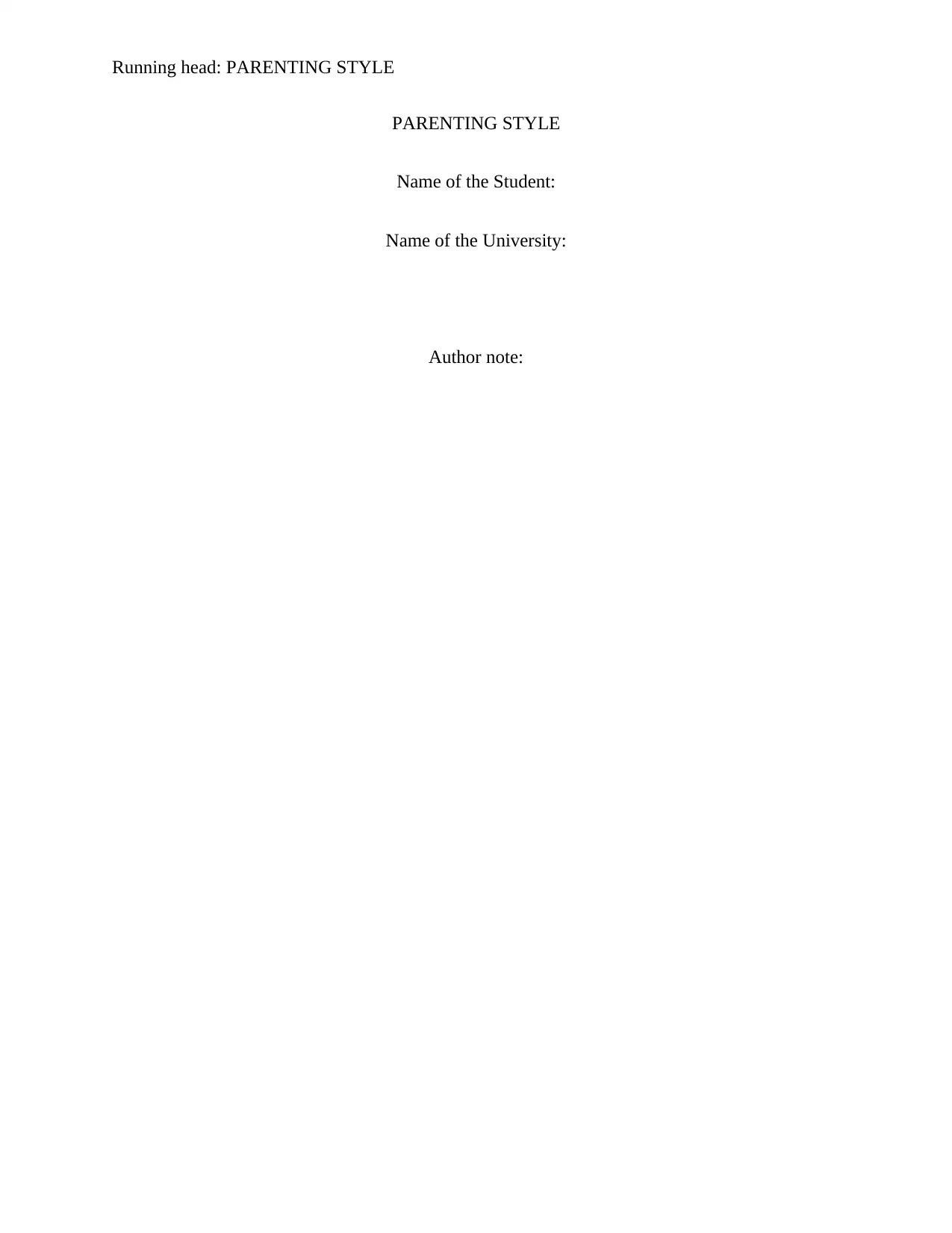
Running head: PARENTING STYLE
PARENTING STYLE
Name of the Student:
Name of the University:
Author note:
PARENTING STYLE
Name of the Student:
Name of the University:
Author note:
Paraphrase This Document
Need a fresh take? Get an instant paraphrase of this document with our AI Paraphraser
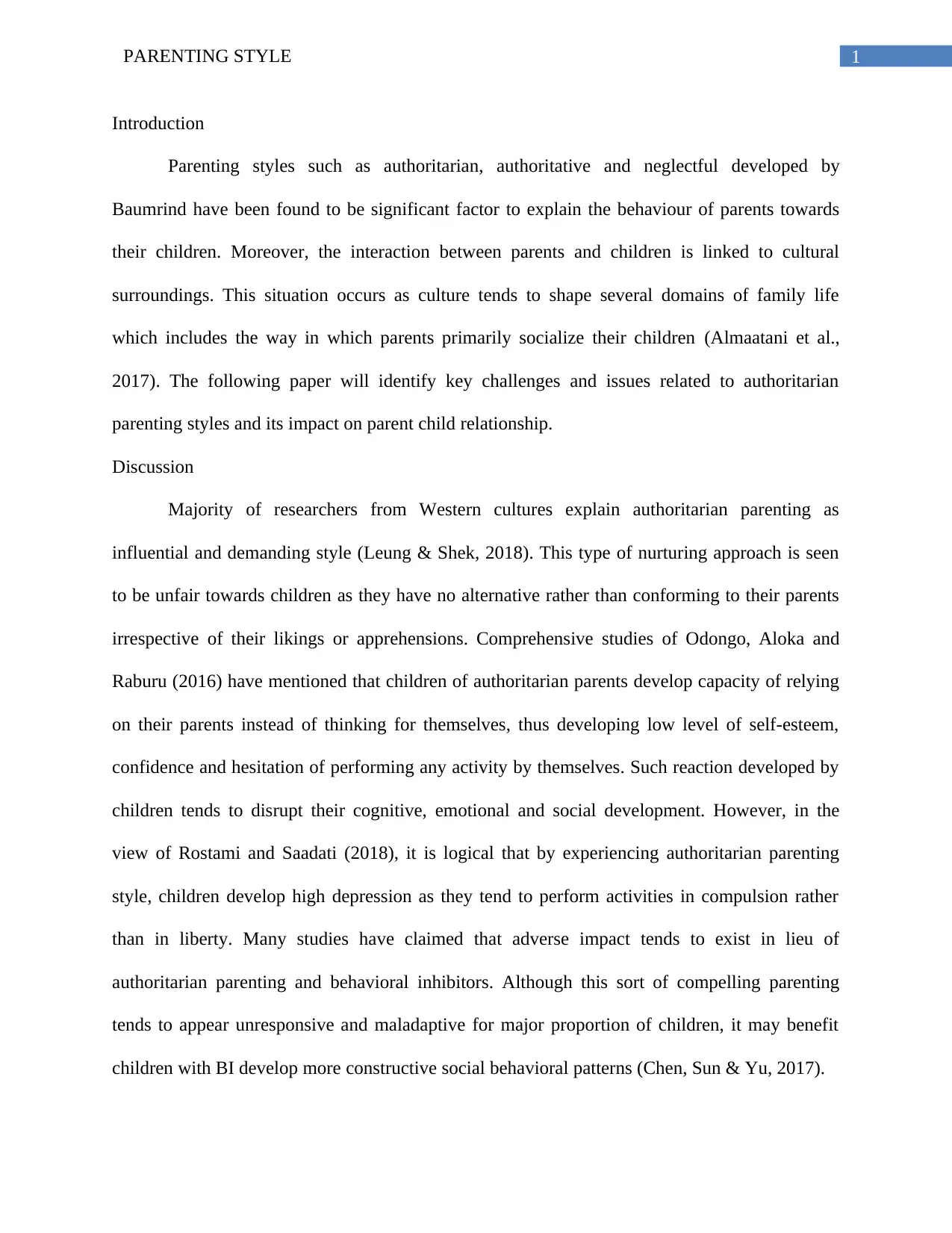
1PARENTING STYLE
Introduction
Parenting styles such as authoritarian, authoritative and neglectful developed by
Baumrind have been found to be significant factor to explain the behaviour of parents towards
their children. Moreover, the interaction between parents and children is linked to cultural
surroundings. This situation occurs as culture tends to shape several domains of family life
which includes the way in which parents primarily socialize their children (Almaatani et al.,
2017). The following paper will identify key challenges and issues related to authoritarian
parenting styles and its impact on parent child relationship.
Discussion
Majority of researchers from Western cultures explain authoritarian parenting as
influential and demanding style (Leung & Shek, 2018). This type of nurturing approach is seen
to be unfair towards children as they have no alternative rather than conforming to their parents
irrespective of their likings or apprehensions. Comprehensive studies of Odongo, Aloka and
Raburu (2016) have mentioned that children of authoritarian parents develop capacity of relying
on their parents instead of thinking for themselves, thus developing low level of self-esteem,
confidence and hesitation of performing any activity by themselves. Such reaction developed by
children tends to disrupt their cognitive, emotional and social development. However, in the
view of Rostami and Saadati (2018), it is logical that by experiencing authoritarian parenting
style, children develop high depression as they tend to perform activities in compulsion rather
than in liberty. Many studies have claimed that adverse impact tends to exist in lieu of
authoritarian parenting and behavioral inhibitors. Although this sort of compelling parenting
tends to appear unresponsive and maladaptive for major proportion of children, it may benefit
children with BI develop more constructive social behavioral patterns (Chen, Sun & Yu, 2017).
Introduction
Parenting styles such as authoritarian, authoritative and neglectful developed by
Baumrind have been found to be significant factor to explain the behaviour of parents towards
their children. Moreover, the interaction between parents and children is linked to cultural
surroundings. This situation occurs as culture tends to shape several domains of family life
which includes the way in which parents primarily socialize their children (Almaatani et al.,
2017). The following paper will identify key challenges and issues related to authoritarian
parenting styles and its impact on parent child relationship.
Discussion
Majority of researchers from Western cultures explain authoritarian parenting as
influential and demanding style (Leung & Shek, 2018). This type of nurturing approach is seen
to be unfair towards children as they have no alternative rather than conforming to their parents
irrespective of their likings or apprehensions. Comprehensive studies of Odongo, Aloka and
Raburu (2016) have mentioned that children of authoritarian parents develop capacity of relying
on their parents instead of thinking for themselves, thus developing low level of self-esteem,
confidence and hesitation of performing any activity by themselves. Such reaction developed by
children tends to disrupt their cognitive, emotional and social development. However, in the
view of Rostami and Saadati (2018), it is logical that by experiencing authoritarian parenting
style, children develop high depression as they tend to perform activities in compulsion rather
than in liberty. Many studies have claimed that adverse impact tends to exist in lieu of
authoritarian parenting and behavioral inhibitors. Although this sort of compelling parenting
tends to appear unresponsive and maladaptive for major proportion of children, it may benefit
children with BI develop more constructive social behavioral patterns (Chen, Sun & Yu, 2017).
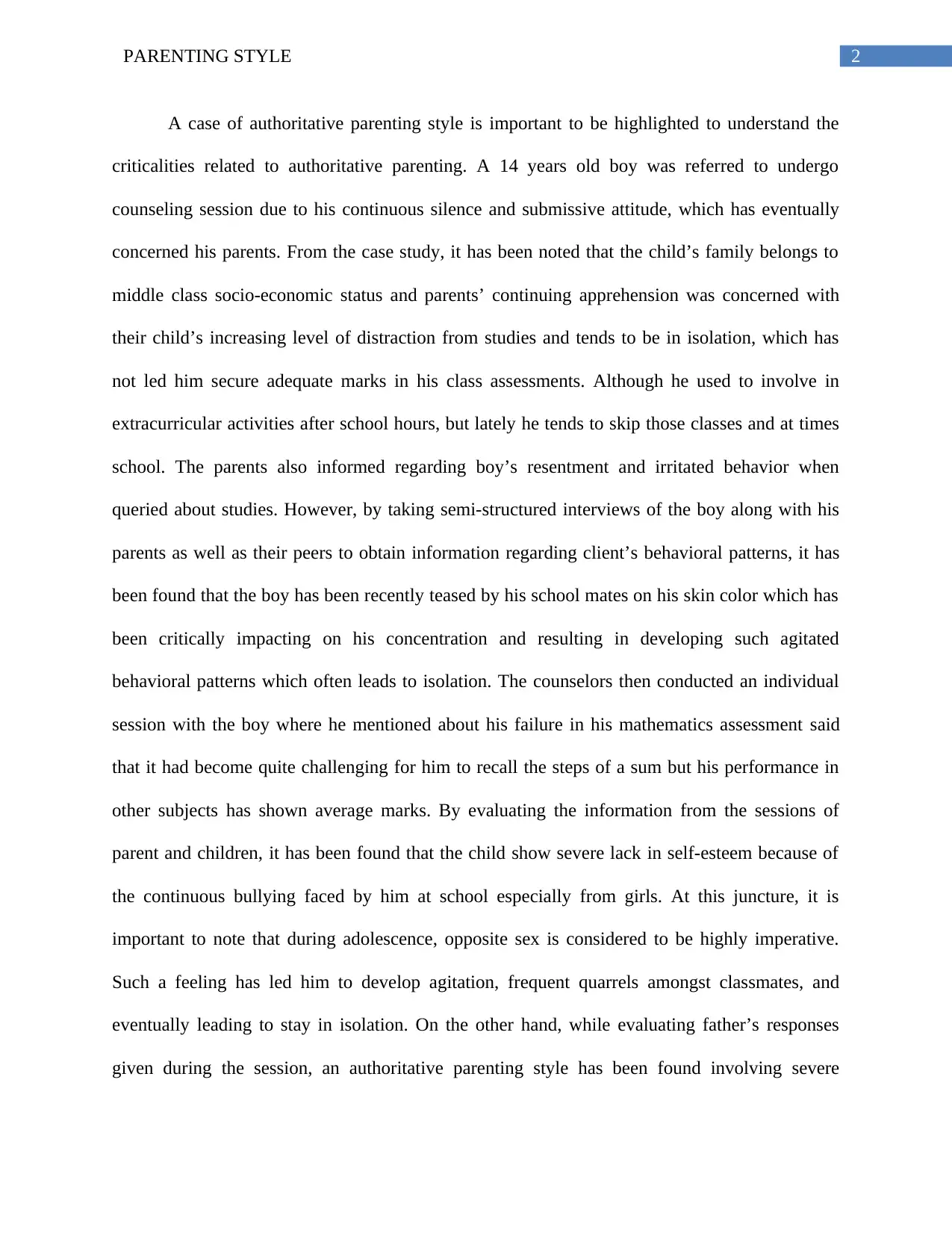
2PARENTING STYLE
A case of authoritative parenting style is important to be highlighted to understand the
criticalities related to authoritative parenting. A 14 years old boy was referred to undergo
counseling session due to his continuous silence and submissive attitude, which has eventually
concerned his parents. From the case study, it has been noted that the child’s family belongs to
middle class socio-economic status and parents’ continuing apprehension was concerned with
their child’s increasing level of distraction from studies and tends to be in isolation, which has
not led him secure adequate marks in his class assessments. Although he used to involve in
extracurricular activities after school hours, but lately he tends to skip those classes and at times
school. The parents also informed regarding boy’s resentment and irritated behavior when
queried about studies. However, by taking semi-structured interviews of the boy along with his
parents as well as their peers to obtain information regarding client’s behavioral patterns, it has
been found that the boy has been recently teased by his school mates on his skin color which has
been critically impacting on his concentration and resulting in developing such agitated
behavioral patterns which often leads to isolation. The counselors then conducted an individual
session with the boy where he mentioned about his failure in his mathematics assessment said
that it had become quite challenging for him to recall the steps of a sum but his performance in
other subjects has shown average marks. By evaluating the information from the sessions of
parent and children, it has been found that the child show severe lack in self-esteem because of
the continuous bullying faced by him at school especially from girls. At this juncture, it is
important to note that during adolescence, opposite sex is considered to be highly imperative.
Such a feeling has led him to develop agitation, frequent quarrels amongst classmates, and
eventually leading to stay in isolation. On the other hand, while evaluating father’s responses
given during the session, an authoritative parenting style has been found involving severe
A case of authoritative parenting style is important to be highlighted to understand the
criticalities related to authoritative parenting. A 14 years old boy was referred to undergo
counseling session due to his continuous silence and submissive attitude, which has eventually
concerned his parents. From the case study, it has been noted that the child’s family belongs to
middle class socio-economic status and parents’ continuing apprehension was concerned with
their child’s increasing level of distraction from studies and tends to be in isolation, which has
not led him secure adequate marks in his class assessments. Although he used to involve in
extracurricular activities after school hours, but lately he tends to skip those classes and at times
school. The parents also informed regarding boy’s resentment and irritated behavior when
queried about studies. However, by taking semi-structured interviews of the boy along with his
parents as well as their peers to obtain information regarding client’s behavioral patterns, it has
been found that the boy has been recently teased by his school mates on his skin color which has
been critically impacting on his concentration and resulting in developing such agitated
behavioral patterns which often leads to isolation. The counselors then conducted an individual
session with the boy where he mentioned about his failure in his mathematics assessment said
that it had become quite challenging for him to recall the steps of a sum but his performance in
other subjects has shown average marks. By evaluating the information from the sessions of
parent and children, it has been found that the child show severe lack in self-esteem because of
the continuous bullying faced by him at school especially from girls. At this juncture, it is
important to note that during adolescence, opposite sex is considered to be highly imperative.
Such a feeling has led him to develop agitation, frequent quarrels amongst classmates, and
eventually leading to stay in isolation. On the other hand, while evaluating father’s responses
given during the session, an authoritative parenting style has been found involving severe
⊘ This is a preview!⊘
Do you want full access?
Subscribe today to unlock all pages.

Trusted by 1+ million students worldwide
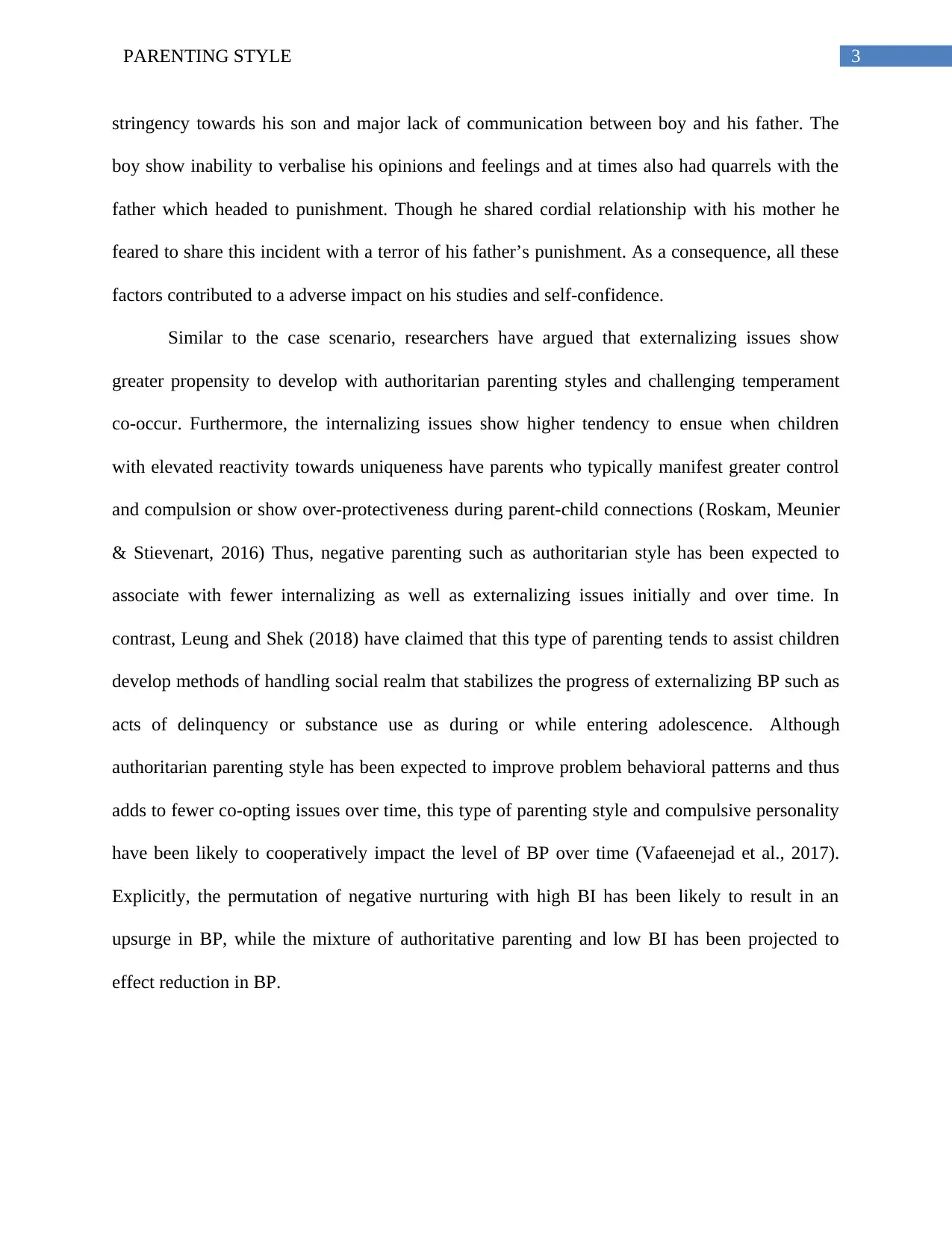
3PARENTING STYLE
stringency towards his son and major lack of communication between boy and his father. The
boy show inability to verbalise his opinions and feelings and at times also had quarrels with the
father which headed to punishment. Though he shared cordial relationship with his mother he
feared to share this incident with a terror of his father’s punishment. As a consequence, all these
factors contributed to a adverse impact on his studies and self-confidence.
Similar to the case scenario, researchers have argued that externalizing issues show
greater propensity to develop with authoritarian parenting styles and challenging temperament
co-occur. Furthermore, the internalizing issues show higher tendency to ensue when children
with elevated reactivity towards uniqueness have parents who typically manifest greater control
and compulsion or show over-protectiveness during parent-child connections (Roskam, Meunier
& Stievenart, 2016) Thus, negative parenting such as authoritarian style has been expected to
associate with fewer internalizing as well as externalizing issues initially and over time. In
contrast, Leung and Shek (2018) have claimed that this type of parenting tends to assist children
develop methods of handling social realm that stabilizes the progress of externalizing BP such as
acts of delinquency or substance use as during or while entering adolescence. Although
authoritarian parenting style has been expected to improve problem behavioral patterns and thus
adds to fewer co-opting issues over time, this type of parenting style and compulsive personality
have been likely to cooperatively impact the level of BP over time (Vafaeenejad et al., 2017).
Explicitly, the permutation of negative nurturing with high BI has been likely to result in an
upsurge in BP, while the mixture of authoritative parenting and low BI has been projected to
effect reduction in BP.
stringency towards his son and major lack of communication between boy and his father. The
boy show inability to verbalise his opinions and feelings and at times also had quarrels with the
father which headed to punishment. Though he shared cordial relationship with his mother he
feared to share this incident with a terror of his father’s punishment. As a consequence, all these
factors contributed to a adverse impact on his studies and self-confidence.
Similar to the case scenario, researchers have argued that externalizing issues show
greater propensity to develop with authoritarian parenting styles and challenging temperament
co-occur. Furthermore, the internalizing issues show higher tendency to ensue when children
with elevated reactivity towards uniqueness have parents who typically manifest greater control
and compulsion or show over-protectiveness during parent-child connections (Roskam, Meunier
& Stievenart, 2016) Thus, negative parenting such as authoritarian style has been expected to
associate with fewer internalizing as well as externalizing issues initially and over time. In
contrast, Leung and Shek (2018) have claimed that this type of parenting tends to assist children
develop methods of handling social realm that stabilizes the progress of externalizing BP such as
acts of delinquency or substance use as during or while entering adolescence. Although
authoritarian parenting style has been expected to improve problem behavioral patterns and thus
adds to fewer co-opting issues over time, this type of parenting style and compulsive personality
have been likely to cooperatively impact the level of BP over time (Vafaeenejad et al., 2017).
Explicitly, the permutation of negative nurturing with high BI has been likely to result in an
upsurge in BP, while the mixture of authoritative parenting and low BI has been projected to
effect reduction in BP.
Paraphrase This Document
Need a fresh take? Get an instant paraphrase of this document with our AI Paraphraser
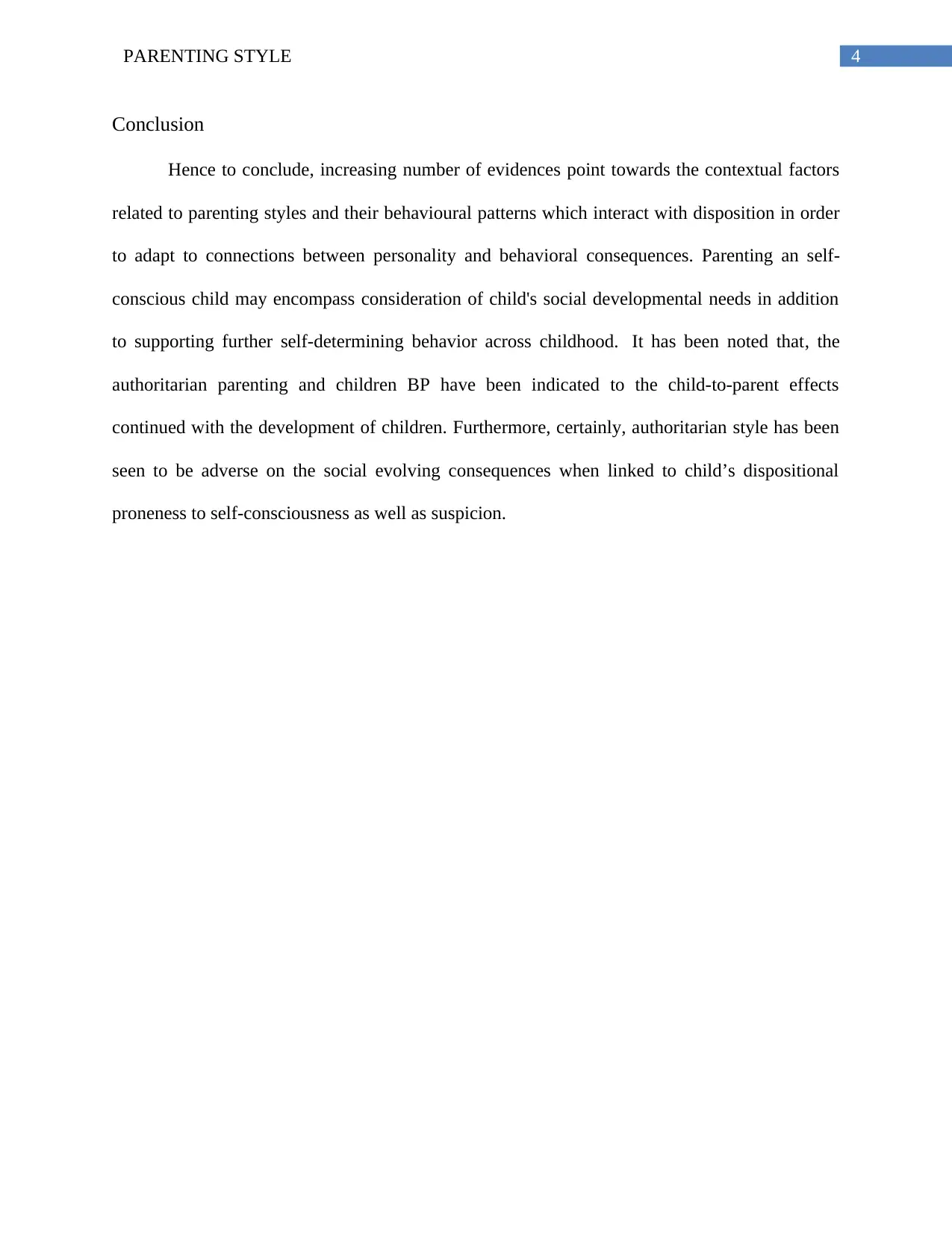
4PARENTING STYLE
Conclusion
Hence to conclude, increasing number of evidences point towards the contextual factors
related to parenting styles and their behavioural patterns which interact with disposition in order
to adapt to connections between personality and behavioral consequences. Parenting an self-
conscious child may encompass consideration of child's social developmental needs in addition
to supporting further self-determining behavior across childhood. It has been noted that, the
authoritarian parenting and children BP have been indicated to the child-to-parent effects
continued with the development of children. Furthermore, certainly, authoritarian style has been
seen to be adverse on the social evolving consequences when linked to child’s dispositional
proneness to self-consciousness as well as suspicion.
Conclusion
Hence to conclude, increasing number of evidences point towards the contextual factors
related to parenting styles and their behavioural patterns which interact with disposition in order
to adapt to connections between personality and behavioral consequences. Parenting an self-
conscious child may encompass consideration of child's social developmental needs in addition
to supporting further self-determining behavior across childhood. It has been noted that, the
authoritarian parenting and children BP have been indicated to the child-to-parent effects
continued with the development of children. Furthermore, certainly, authoritarian style has been
seen to be adverse on the social evolving consequences when linked to child’s dispositional
proneness to self-consciousness as well as suspicion.
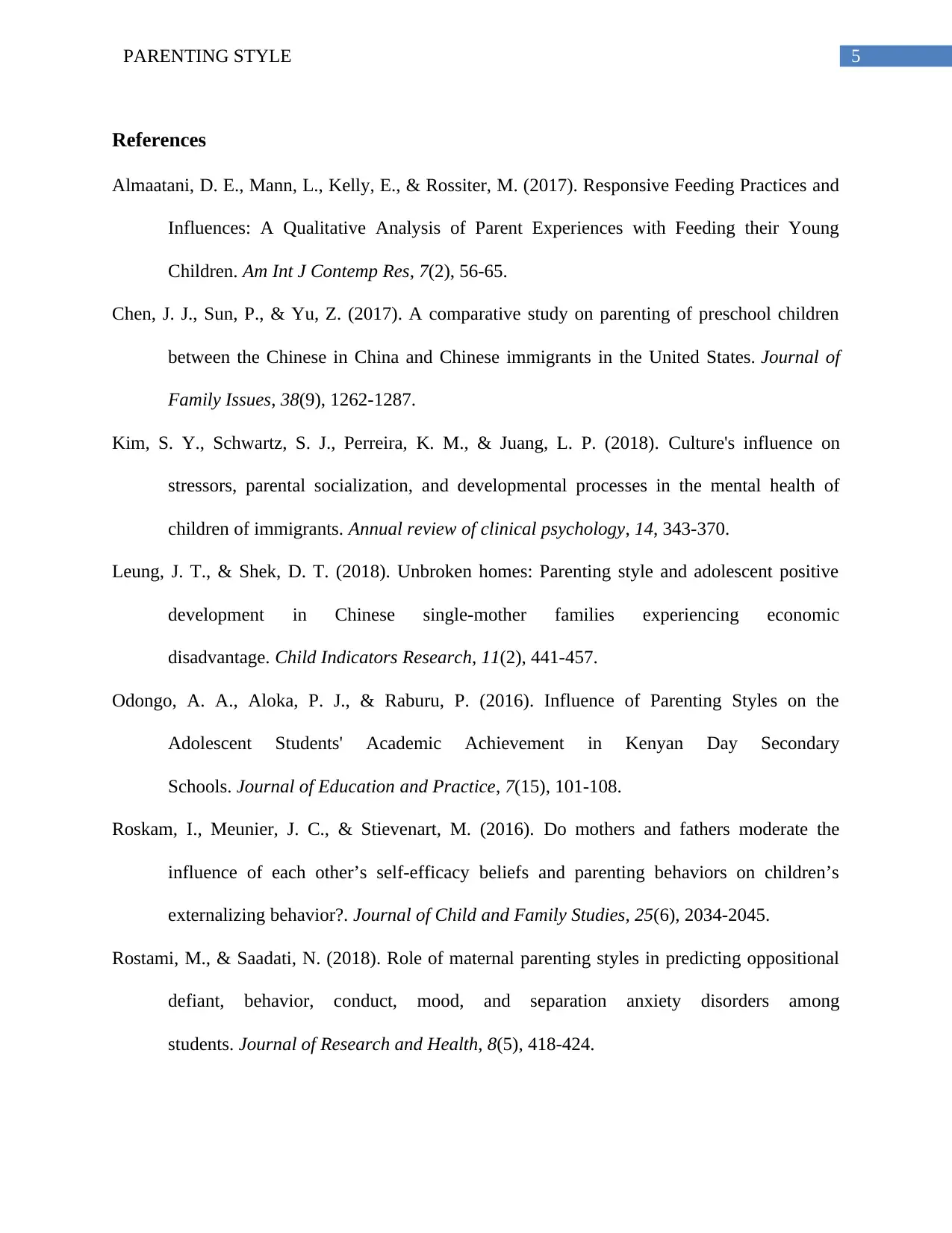
5PARENTING STYLE
References
Almaatani, D. E., Mann, L., Kelly, E., & Rossiter, M. (2017). Responsive Feeding Practices and
Influences: A Qualitative Analysis of Parent Experiences with Feeding their Young
Children. Am Int J Contemp Res, 7(2), 56-65.
Chen, J. J., Sun, P., & Yu, Z. (2017). A comparative study on parenting of preschool children
between the Chinese in China and Chinese immigrants in the United States. Journal of
Family Issues, 38(9), 1262-1287.
Kim, S. Y., Schwartz, S. J., Perreira, K. M., & Juang, L. P. (2018). Culture's influence on
stressors, parental socialization, and developmental processes in the mental health of
children of immigrants. Annual review of clinical psychology, 14, 343-370.
Leung, J. T., & Shek, D. T. (2018). Unbroken homes: Parenting style and adolescent positive
development in Chinese single-mother families experiencing economic
disadvantage. Child Indicators Research, 11(2), 441-457.
Odongo, A. A., Aloka, P. J., & Raburu, P. (2016). Influence of Parenting Styles on the
Adolescent Students' Academic Achievement in Kenyan Day Secondary
Schools. Journal of Education and Practice, 7(15), 101-108.
Roskam, I., Meunier, J. C., & Stievenart, M. (2016). Do mothers and fathers moderate the
influence of each other’s self-efficacy beliefs and parenting behaviors on children’s
externalizing behavior?. Journal of Child and Family Studies, 25(6), 2034-2045.
Rostami, M., & Saadati, N. (2018). Role of maternal parenting styles in predicting oppositional
defiant, behavior, conduct, mood, and separation anxiety disorders among
students. Journal of Research and Health, 8(5), 418-424.
References
Almaatani, D. E., Mann, L., Kelly, E., & Rossiter, M. (2017). Responsive Feeding Practices and
Influences: A Qualitative Analysis of Parent Experiences with Feeding their Young
Children. Am Int J Contemp Res, 7(2), 56-65.
Chen, J. J., Sun, P., & Yu, Z. (2017). A comparative study on parenting of preschool children
between the Chinese in China and Chinese immigrants in the United States. Journal of
Family Issues, 38(9), 1262-1287.
Kim, S. Y., Schwartz, S. J., Perreira, K. M., & Juang, L. P. (2018). Culture's influence on
stressors, parental socialization, and developmental processes in the mental health of
children of immigrants. Annual review of clinical psychology, 14, 343-370.
Leung, J. T., & Shek, D. T. (2018). Unbroken homes: Parenting style and adolescent positive
development in Chinese single-mother families experiencing economic
disadvantage. Child Indicators Research, 11(2), 441-457.
Odongo, A. A., Aloka, P. J., & Raburu, P. (2016). Influence of Parenting Styles on the
Adolescent Students' Academic Achievement in Kenyan Day Secondary
Schools. Journal of Education and Practice, 7(15), 101-108.
Roskam, I., Meunier, J. C., & Stievenart, M. (2016). Do mothers and fathers moderate the
influence of each other’s self-efficacy beliefs and parenting behaviors on children’s
externalizing behavior?. Journal of Child and Family Studies, 25(6), 2034-2045.
Rostami, M., & Saadati, N. (2018). Role of maternal parenting styles in predicting oppositional
defiant, behavior, conduct, mood, and separation anxiety disorders among
students. Journal of Research and Health, 8(5), 418-424.
⊘ This is a preview!⊘
Do you want full access?
Subscribe today to unlock all pages.

Trusted by 1+ million students worldwide
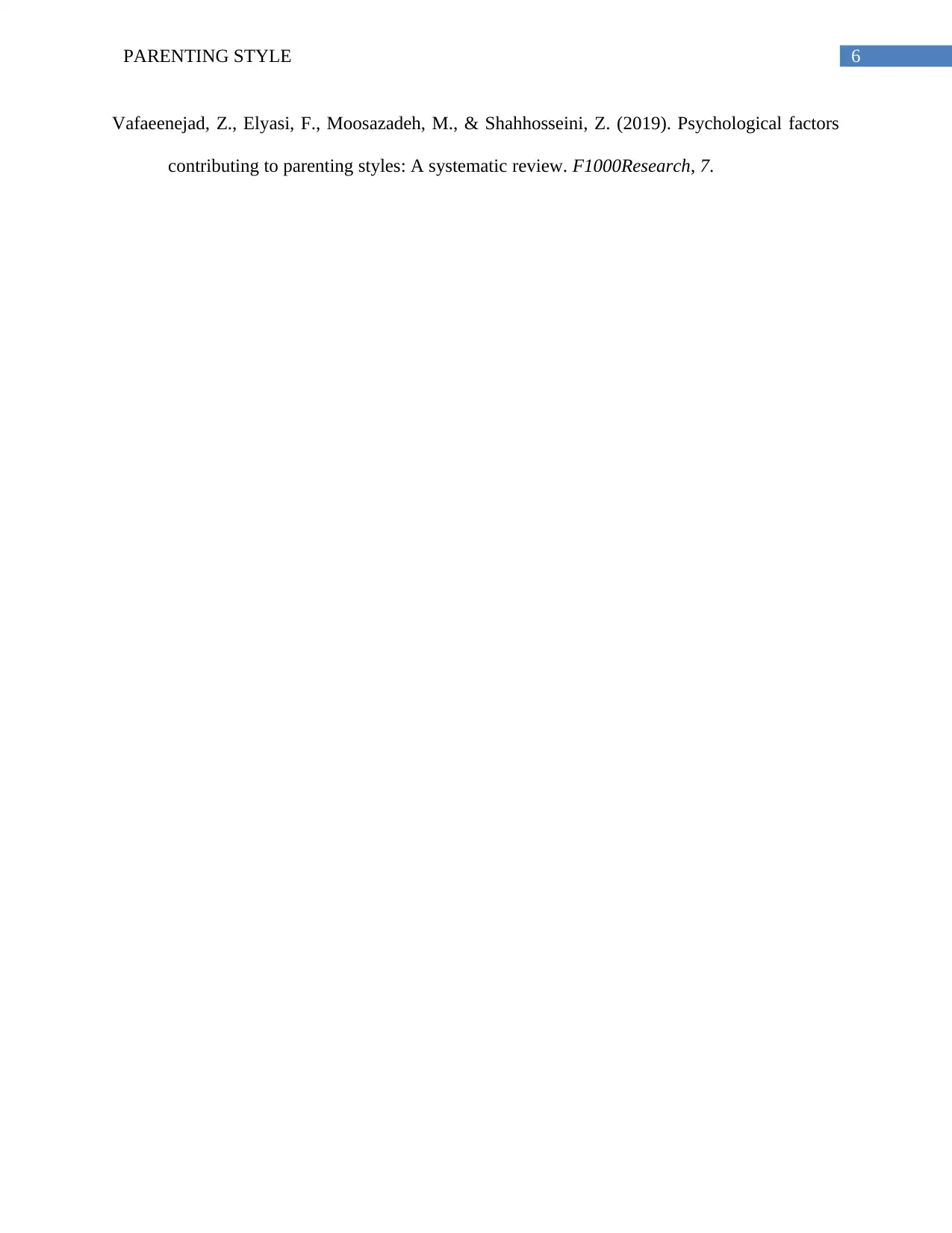
6PARENTING STYLE
Vafaeenejad, Z., Elyasi, F., Moosazadeh, M., & Shahhosseini, Z. (2019). Psychological factors
contributing to parenting styles: A systematic review. F1000Research, 7.
Vafaeenejad, Z., Elyasi, F., Moosazadeh, M., & Shahhosseini, Z. (2019). Psychological factors
contributing to parenting styles: A systematic review. F1000Research, 7.
1 out of 7
Related Documents
Your All-in-One AI-Powered Toolkit for Academic Success.
+13062052269
info@desklib.com
Available 24*7 on WhatsApp / Email
![[object Object]](/_next/static/media/star-bottom.7253800d.svg)
Unlock your academic potential
Copyright © 2020–2026 A2Z Services. All Rights Reserved. Developed and managed by ZUCOL.





